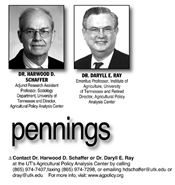|
Coordination Of Agricultural Policy

This last week, we were contacted by a European colleague who wanted to talk about agricultural policy and the need for reserve stocks that would protect the world’s most vulnerable populations against crop failures and extremely high prices.
The issue of reserve stocks is right down our alley because they are an essential element of supply management programs designed to protect consumers during periods of time when farmers in one or more areas experience production shortfalls that result in extremely high prices and a significant increase in malnutrition and death.
During the call we discussed the Agricultural Policy Analysis Center/Texas Farmers Union proposal that APAC and the TFU developed ahead of the adoption of the 2018 Farm Bill. We discussed how the policy would build government-held reserve stocks during times of marginally surplus production and low prices and release them into the commercial market when crop production is below demand and prices have increased to or above a specified release price.
Details of this policy proposal are available at http://www.agpolicy.org/articles17.htm (columns 890-897), so rather than review that information here we want to examine some other ideas that came up in that conversation.
The challenges EU farmers live with are little different from the problems facing US and Canadian farmers. All three nations (for this issue the EU functions as a nation-like entity) have mature agricultural economies where most of the tillable land is already in production, barring the potential impact of climate change. Any increases in production in these three countries are going to come from increased knowledge of seed and soil science.
By way of contrast, in most other nations – especially developing countries – increased production can come from bringing additional land into crop production and/or bringing local yields up to the levels achieved by farmers in places like the US, the EU, and Canada. To expect these other countries to implement policies that limit production is likely an exercise in folly. Only when they have developed a mature agricultural economy will they be willing to implement production managing policies.
To us and our EU colleague, it would make sense for the three countries to implement compatible supply management policies, including the holding of reserve stocks that could be used in emergencies.
The development of compatible supply management policies that avoid “beggar thy neighbor” export policies will face challenges. Among the challenges are differences in cost of production and shifts in exchange rates. With thoughtful discussions, these problems need not be seen as insurmountable obstacles.
Perhaps progressive farm groups in the three countries will want to begin discussions among themselves on ways to deal with these issues in a manner that removes obstacles to adopting coordinated supply management policies that benefit farmers everywhere in the world.
These policies could 1) protect farmers against long periods of time when they are producing crops at prices that are well below the full cost of production, 2) provide needed environmental benefits, and 3) maintain a reserve to protect consumers in years when there are significant production shortfalls.
One significant issue that needs to be resolved if these countries are to develop and adopt such a set of policies is the current WTO Green Box definition. In the past, the Green Box defined dumping as selling products at a price below the full cost of production. Thus, supply management policies that resulted in prices that were at or slightly above the full cost of production were trade legal.
In recent years the Green Box definition of dumping has been redefined as the selling of an agricultural commodity at a price that is below the general market price in the exporting country. This is a significant change since current US policies often result in commodity prices that are well below production costs. Thus, US corn that costs $4.00 per bushel to produce but is exported at a $3.00 price would not be considered a trade problem as long as US subsidies remained below an agreed upon level. The result is a policy that harms farmers in countries that cannot afford to provide some minimal level of farm support when prices are below the cost of production.
We are arguing that all of the farmers in the world would benefit from a change in the definition of the Green Box that would allow countries, including Canada, the EU, and the US, to develop a coordinated set of supply management policies that would enable their farmers to receive the full cost of production for the commodities they produce and sell.
In addition, these policies would include a means of accumulating stocks of storable commodities that could be used during periods of widespread production shortfalls, thereby protecting consumers worldwide from the kinds of high prices we saw in the early years of the last decade.
Similarly, coordinated policies would avoid the destructive agricultural trade wars we experienced during the last half of the 20th century. ∆
DR. HARWOOD D. SCHAFFER: Adjunct Research Assistant Professor, Sociology Department, University of Tennessee and Director, Agricultural Policy Analysis Center
DR. DARYLL E. RAY: Emeritus Professor, Institute of Agriculture, University of Tennessee and Retired Director, Agricultural Policy Analysis Center
|
|